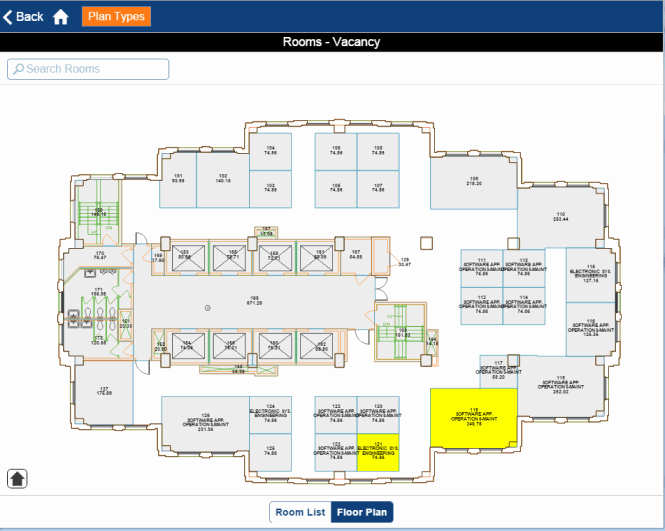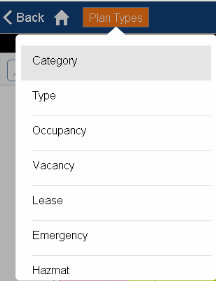Space Book mobile app
Space Book Mobile App: Overview
While in the field, at an off-site meeting, or in other situations in which they do not have a laptop connected to the Archibus database, facility managers, department managers, move managers, and others involved in the space use of a building may wish to access floor plans and building data. For example, a facility manager discussing new HVAC equipment with a vendor may need to know the square footage of the boiler room, a move manager at an off-site meeting may need to know the location of vacant rooms, a department manager while commuting may want to check the rooms assigned to their department.
To enable these users to access facility information when they may not have access to a laptop connected to the Archibus data, Archibus offers the Space Book mobile app, which provides staff with quick and easy access to key building data and drawings from their tablet or iPad. Additionally, the app offers tasks for conducting paperless space surveys using mobile devices.

Note: The Space Book mobile app works in conjunction with the Space Inventory application or Space SaaS module. Your site should have a license for one of these programs so that mobile users can access the space inventory developed in Web Central and update it using the Space Book mobile app.
Users working with the Space Book app will find that it has an intuitive interface and messages to walk you through its use. This topic overviews the Space Book mobile app, and has the following sections:
- Typical Use Scenarios
- Device User: Download the Space Inventory to the Mobile Device
- Transaction and Non-transaction Space Inventories
You will also want to see these topics:
- Space Surveys and Mobile Apps (Concept)
- Conducting Space Surveys with the Space Book App
- Facility Manager Tasks
Typical use scenarios
Following are some typical uses of the Space Book mobile app:
Access basic space information
While in a meeting or in the field, personnel might want to check the details of a site, building, floor, or room. Having the space data immediately available on a mobile device enables users to access this information without consulting a laptop connected to the network. For any item, they select the Details button to access key data. To find this information, mobile users can search for sites, buildings, floors, and rooms. They can also drill down to more detailed information, such as selecting a building and drilling down to its floors and rooms. The Home button brings them back to their list of sites.
Access floor plan drawings on a tablet
Additionally, personnel may want to access floor plans so that they can check the location of a room, department assignment of a room, egress points on the floor, and so on. Depending on their role in the company and the information that your site tracks, personnel may have access to the following types of plans:
- Allocation
- Category
- Type
- Occupancy
- Vacancy
- Lease
- Emergency
- Survey
- Hazmat
To see these types of information on the drawing, the user chooses the appropriate plan type from the Plan Type drop down list. 
For example, in the above image of the floor plan, the mobile user has selected the Vacancy plan type so that the drawing highlights rooms according to their vacancy status. Note that before you explicitly choose a plan type, the drawing displays the first plan type in the list. Once you select a plan type, it stays in effect as you load different floor plan drawings. This is handy for comparing like data on different floors.
Update room information ad hoc
FM Staff in the field might compare an actual room to its description on the mobile device and note that the Room Category, Type, Standard, Division, or Department information is wrong . They can make changes to the room attribute data by following the same method as field auditors performing a survey, that is, they start an ad-hoc survey on the spot. If they have the permissions to do so, they can close out this ad-hoc survey and update the inventory immediately, right from the field.
Email a floor plan
An FM staff member may wish to send themselves additional notes on a floor plan or email a condition to a colleague. For instance, in the field they may notice that two rooms have merged and they wish to email a CAD specialist to update a drawing to reflect this change. Or, they may want to email the maintenance manager about a stained ceiling tile indicating a leaking pipe. With the Space Book app, they can send an image of the floor plan in an email message so that the receiver can visualize the rooms they are referring to. For example, suppose you are using an iPad and have the Archibus floor plan that you wish to send visible on the screen. You press the menu button and the power button to take a picture of the screen, navigate to the Camera Roll in your Photos application, select the photo, and forward it as mail.
Perform space surveys
Many sites wish to periodically survey their facility to ensure that the electronic room inventory matches the real-world situation. For example, have personnel on their own combined cubicles into a larger space, converted a conference room into an office use, used an office as storage area? In cases such as these, the electronic inventory no longer matches the actual conditions in the facility. To assess the real-world situation, field auditors visit each room and note any discrepancies with the electronic inventory. They then upload this information to a survey table on the Archibus server for the facilities manager to view and investigate. After review, the facilities manager can update the official electronic inventory with the needed changes.
As part of executing the survey, they can use their mobile device's camera to take photos of conditions and then attach them to room records.
For information, see Conducting Space Surveys using the Space Book Mobile App.
Device user: download the space inventory to the mobile device
To get started using the Space Book app, the device owner must download the inventory data and floor plans to the mobile device using the following actions of the Space Book app:
-
 Download Data. This action downloads the list of Sites, Buildings, and Floors and other data from the server. The action also downloads the Site Photo and the Building Photo bitmaps that the app presents in its lists.
Download Data. This action downloads the list of Sites, Buildings, and Floors and other data from the server. The action also downloads the Site Photo and the Building Photo bitmaps that the app presents in its lists.  Download Floor Plans. This action downloads the floor plans in bitmap and SVG format. The plans include their thematic highlights and labels so that they are available off-line.
Download Floor Plans. This action downloads the floor plans in bitmap and SVG format. The plans include their thematic highlights and labels so that they are available off-line.
On the server, floor plan drawings as well as the information for sites, buildings, and floors may change over time as facility managers, space managers, and those working with Archibus on the network update the facility data. Once device owners initially download the data, they should periodically run the above actions to update the lists and drawings on the device with the latest versions from the server. Similarly, CAD users should periodically publish the drawings as enterprise graphics so that they are available for download.
For more information, see Mobile Apps: Transferring Archibus Data and Drawings.
Transaction and non-transaction space inventories
The Space Book app can access both transaction-based and a non-workspace transaction inventories. The Space & Occupancy Survey mobile app, on the other hand, is specifically designed to work with and update a transaction-based inventory from the mobile device.
If you have a non-transaction inventory and want to also record occupancy data, you can use the Space & Occupancy Survey mobile app instead of the Space Book app. For information on the features each provides, see Space Surveys and Mobile (Concept).
If you use Space Book with a transaction-based inventory, the data that appears on the mobile device is the data as of the current date (while the server-side transaction data also includes data for past and future dates). If you are using the transaction-based inventory, and if your team uses the Space Book app to make corrections from the field, you will want to run Web Central's Space Inventory / Space Manager / Workspace Transaction Exceptions report. This report shows any future planned transactions, such as moves or space re-allocations, that you should review in the light of this up-to-date information from the field.
For more information on these two types of inventories, see Transactional vs. Non-Transactional Space Inventory.